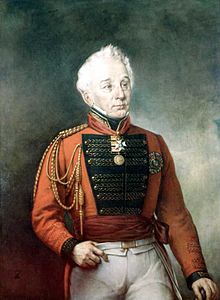Frederick Philipse Robinson
| Sir Frederick Philipse Robinson | |
|---|---|

George Theodore Berthon's Sir Frederick Philipse Robinson
|
|
| Born | September 1763 Highlands, New York, Province of New York |
| Died | 1 January 1852 (aged 88) Brighton, Sussex, England |
| Buried at | Parish Church, Hove, Sussex |
| Allegiance | Great Britain |
| Service/branch | British Army |
| Years of service | 1777–1840s |
| Rank | General |
| Battles/wars | Battle of Horseneck, Battle of Plattsburgh, Battle of Osona, Battle of Vittoria, |
| Awards | GCB |
Sir Frederick Philipse Robinson, GCB (September 1763 – 1 January 1852) was a soldier, born in the Highlands, near New York, in September 1763, who fought for Britain during the American War of Independence. His father was a Virginian who moved to New York, marrying a wealthy heiress of the Philipse family with Dutch and Bavarian ancestry.
On the conclusion of peace he went to England. He subsequently took part in the War of 1812 and commanded a brigade at the unsuccessful Battle of Plattsburgh. In 1813 and 1814 he commanded a brigade under Wellington in Spain. He was a provisional Lieutenant-Governor of Upper Canada in 1815. Afterwards he was governor of Tobago, and he became a general in 1841. He died at Brighton, England.
He was the fourth son of Colonel Beverley Robinson, son of John Robinson, President of the Council at Virginia, North America. The Robinsons were, in property and family, the leading men in that province. John Robinson was nephew to Dr. John Robinson, Bishop of London, and went to America as secretary to government. He resided at Williamsburg and married Catherine Beverley, daughter of Robert Beverley, Esq., of Beverley, Yorkshire. Dr. John Robinson, Bishop of London, was distinguished both as a statesman and a divine. He was ambassador to the court of Sweden during the years 1683 to 1708. In the year 1710 he was made Bishop of Bristol, in the following year Lord Privy Seal. In 1712 he was first plenipotentiary at the Treaty of Utrecht, and soon after his return was translated to the See of London. He lies buried in the churchyard at Fulham. Colonel Beverley Robinson arrived in New York in 1745 as captain of an independent company, raised in Virginia for the purpose of defending the frontier against the Indians, which company was disbanded in 1748. He soon afterward married Susannah Philipse, daughter of Frederick Philipse, second Lord of Philipsburg Manor, with whom he obtained large pieces of property in New York as his wife's share of the Philipse Patent. He died at Bath in March 1792 leaving a numerous family.
...
Wikipedia
